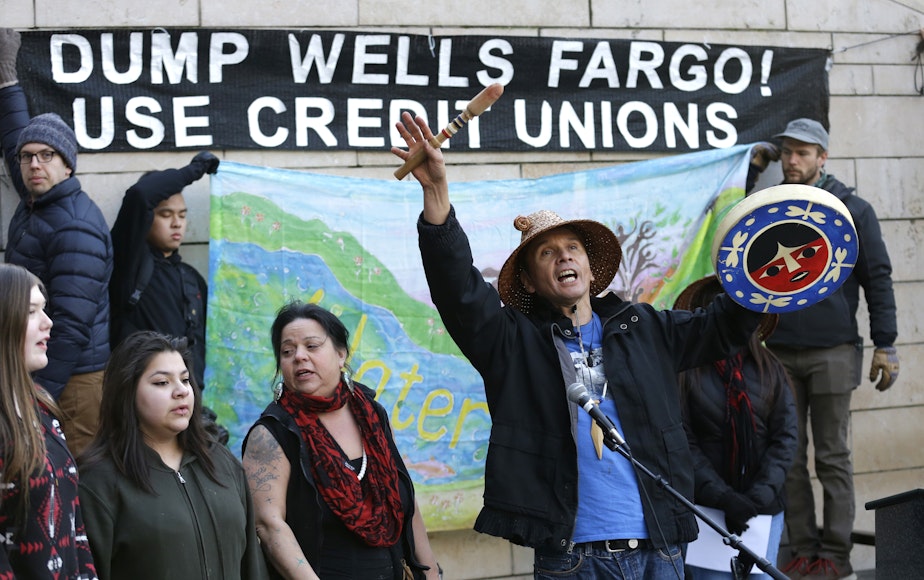What Seattle's 'boycott' could mean for Wells Fargo

UPDATE 2/7/2017, 4:30 p.m.
The Seattle City Council unanimously voted Tuesday afternoon to cut ties with banking giant Wells Fargo over its role as a lender to the Dakota Access Pipeline project, as well as other business practices.
Cheers erupted from the crowd when the measure passed and members of several Native American tribes stood to thank the council.
Meantime the U.S. Army Corps of Engineers approved the next phase in the construction of the Dakota Access Pipeline, paving the way for the project’s completion.
Original Story:
Sponsored
Seattle lawmakers are expected to cut ties with Wells Fargo Tuesday because the bank is a lender for the Dakota Access Pipeline. It's one recent example of how corporations are experiencing, and responding to, boycotts.
Protests in Seattle against the Dakota Access Pipeline project have been large and frequent, often organized by local tribal members.
Protesters, many of them Native people from Washington state, share the concerns of the Standing Rock Sioux Tribe, which says the pipeline would threaten tribal water supplies, land and cultural sites.
Seattle's City Council is also on record against the project.
But Wells Fargo, the bank the city does most of its business with, is among 17 lenders for the pipeline. That doesn't sit well with city leaders, especially after the bank's recent scandal over opening accounts without customer knowledge.
Sponsored
Socialist City Councilmember Kshama Sawant led the charge for Seattle to divest from Wells Fargo.
"Taking on this issue, this is not just about Seattle," Sawant said. "This is about our global fight against climate change and the oil lobby."
Her bill would prohibit any city business with Wells Fargo once the city's contract with the bank expires at the end of 2018.
For Wells Fargo's part, a spokesperson said they're proud of the support they've given Seattle.
"There have been a number of areas where we can continue to do better, and when we make mistakes, we own up to it and we make improvements," said Mary Knell, the bank's commercial banking manager for Washington state. "It is disappointing that [the Seattle City Council has] taken this approach."
Sponsored
Wells Fargo has also lost business recently with the City of Chicago, for reasons related to the banking scandal, and the University of California system because the bank invests in private prisons. The Navajo Nation is considering cutting ties as well, because of the pipeline and other matters.
University of Washington business professor Abhinav Gupta said corporate boycotts may not immediately affect a company financially. He said Seattle’s divestment could be a drop in the bucket for Wells Fargo. But Gupta said that's often not the point.
"Consumer boycotts, whenever they happen, often they are initiated by a small group of consumers, who directly would not be able to alter companies cost-benefit analysis, but at the same time, the reputation harm that they generate is often enough to get companies to react," Gupta said.
That might be what's happening with Wells Fargo.
Spokesperson Knell said the bank has changed some practices after hearing concerns about the pipeline.
Sponsored
"We have enhanced our due diligence on projects such as this to include more research into whether indigenous communities are affected and that they have been properly consulted," she said.
But, she said the bank is bound by contract to carry out loans for the pipeline.
Seattle's lawmakers realize their bill may not cancel the project, but they hope it encourages more corporate social responsibility.
Councilmember Sawant said whether it's protesting after the inauguration, or passing new laws, it's important for people to speak up for their beliefs.
"We've seen the power of the ruling elite has limits, and those limits are determined by how powerful our movements are in the 99 percent," she said.
Sponsored
It's not clear which financial institutions the city will work with in the future.
More than a dozen other banks are direct lenders to the pipeline, including CitiBank and ING. Still more banks are connected to companies that are building the project. For example, J.P. Morgan Chase, Bank of America, and U.S. Bank are lenders to Energy Transfer Partners.
City Council members including Sawant, Mike O’Brien and Lisa Herbold are interested in contracting with a credit union or state-run public bank. Both of those options, however, would require a change to state law.
Editor's note 02/09/2017: We have updated this story to reflect that some financial institutions are lenders to Energy Transfer Partners, a company involved with building the pipeline.

